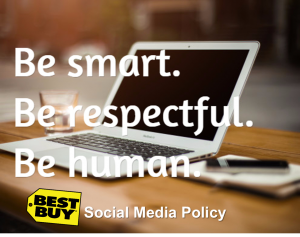Do you need to build a social media policy for your business?
Recently, I prepared a presentation for an organization on creating a social media policy. What I found was that most of the relevant information was from 2009-2011. That is how long it has been since social media policies have been important to have for your business.
So let’s take a look at the key components and a few resources to help you create a social media policy for your company.
Why do you need a policy?
A social media policy outlines what is or isn’t allowed for your employees. You have other policies and procedures that provide corporate guidelines. The social media policy provides the guidelines for how your employees will communicate with the world. A policy will set boundaries and provide a baseline for now. It can be changed as issues emerge.
Because your social media will portray your company culture and your brand, you want to ensure that whatever is presented on social media platforms is going to represent your company and carry your message out to the customers AND competitors in your industry. You also want to ensure that social media will fulfill your company objectives about how you will secure leads and generate sales.
How to develop your social media policy
- Decide who will help you create it – will you create by committee? Will HR create it? Will IT or Operations create it? Ultimately, whatever you create should be approved by your corporate attorney to ensure that you are not violating any rules.
- Select the aspects that need to be represented in your policy – what channels, who can have access, and possibly perform a SWOT analysis of your company’s use of social media.
- Be specific about the Can’s, Can’ts and Should’s. If they are not allowed to talk about new products until a specific department releases the news, spell it out.
- Consider the following points:
- Who can use social media in company on behalf of the company
- When can they use social media – on company time or on personal time.
- Who approves what is posted on social media – specific departments, the IT department, HR department, the CIO, the marketing department
- How will the employee represent themselves – is the employee “on” 24/7, when they are representing the company does their “handle” include a portion of your company name, like @deetime2mrkt. It is always best to maintain a professional representation of yourself on any social or on-line communication outlet.

- What ethical standards will be followed by the employee – are they already in place for the company? If so, the social media policy should remain consistent with your ethics policy.
- Who/how will you manage brand consistency – will you provide training? will each department ensure compliance? Is someone monitoring on a daily, weekly, monthly basis?
- Will you use disclaimers? If an employee is required, if someone posts a comment that is not congruent with the company stance, you may not be held liable for those comments.
Consider these items for inclusion in your policy, as long as you define what they mean:
- Resist the urge to lash out in public. Take it off-line.
- Respect proprietary information.
- Know internal policies before posting.
- Be timely, but pause and re-read before replying.
- Use common sense.
- Play nice
Can you fire someone for complaining about the job on social media?
The answer depends upon what they are doing. This USAToday article explains some of the rulings from the National Labor Relations Board. Here are a few of the highlights from the article.
- It is illegal for an employee to be fired for a post about working conditions, whether it’s pay, hours, assignments, difficult supervisors, dress code, or any other issue.
- Posts that damage a company, disparage its products or services or reveal trade secrets or financial information are actionable. But if they include criticism of related working conditions, they might not be.
- Posts cannot encourage others to be insubordinate i.e. work slow downs.
- Griping or insults by one person with no connection to working conditions are NOT protected. You cannot “dis” your boss’ appearance or speech.
The Answer
- Create a social media policy, including examples, spelling out what employees can and cannot post.
- Review your policy with an HR specialist or attorney to ensure it is not violating any laws.
- If you are not sure whether a post is actionable, check before you act!
Would you like to review some examples of policies before you write yours? Here is a link that has about 240 company policies that you can read. http://socialmediagovernance.com/policies/
Would you like a great starting point? This tool provides a social media policy creating wizard http://socialmedia.policytool.net/welcome/wizard
As always, if I can be of assistance to you in your social media needs, please contact me!
Here are other resources and links to social media policies that I used as research for this article:
- http://forums.bestbuy.com/t5/Welcome-News/Best-Buy-Social-Media-Policy/td-p/20492
- http://mashable.com/2009/04/27/social-media-policy/#2qgmD25QIPq4
- http://www.forbes.com/sites/jeannemeister/2013/02/07/to-do-update-companys-social-media-policy-asap/
- http://www.inc.com/guides/2010/05/writing-a-social-media-policy.html
- http://mashable.com/2009/06/02/social-media-policy-musts/#fuOZpfa.kaqT